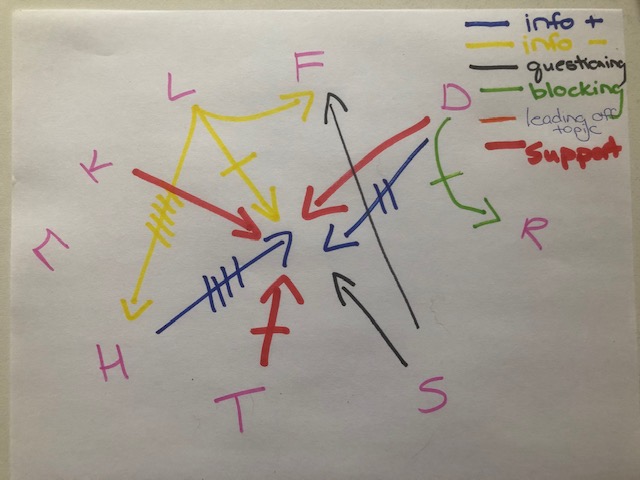Groupthink is defined as “a process of flawed decision making that occurs as a result of strong pressures among group members to reach an agreement”.
“Groupthink is a phenomenon that occurs when the desire for group consensus overrides people’s common sense desire to present alternatives, critique a position, or express an unpopular opinion. Here, the desire for group cohesion effectively drives out good decision-making and problem solving.” mindtools.com
RELEVANCE TO PARENTS: This could be why specialty programs never evolve, why some programs designed to fail are accepted by Boards, why some programs are described as a “dumpster on fire” and how they slip through the cracks. How things that are obviously broken in schools, stay broken, and how systemic oppression to marginalized groups are rarely challenged.
Does anyone remember the NASA Challenger disaster that exploded in space? When they analyzed the process that led to the deadly decisions, they concluded it was partly due to Groupthink.
Groups that are too cohesive, too tightly bonded, too tightly dependent on each other, too tightly socially connected, and are too similar, will bread an environment where it’s best that everyone just agree. Even when the evidence is laid out in front of them, it will be ignored and the pressure to agree will push people to just go with the flow and carry on. Conflict, even productive conflict, will be discouraged. An environment will become the norm where no one speaks up…even when they should. Groups that are too cohesive apply social pressure for everyone to conform. Disagreement is then seen as a negative trait, insulting to the members, or that person is labelled a trouble maker and their input is disregarded.
It takes a specific type of person to want to be a teacher. Many teachers have similar personality traits and temperaments, a common thread amongst all of them. For the people who have the desire to advance their careers, and for the ones who fit the tight mold of administration, I feel it’s a fair assessment in concluding they are all expected to belong to a very exclusive highly dependent social-work group.
Groups that create an environment where it is safe to disagree with the topic, are the level that we want our district and Boards to function. Especially because open system groups are the most responsive to change and feedback from their community. **Feedback is a crucial part of the program management cycle.
Points of impact:
- Program development and program maintenance
- Whistleblowing, staff not being able to bring up concerning issues
- Discrimination – exclusion
- Racism
- Ableism
- Policy development
- Workplace toxicity (Employee depression, bullying, etc)
- SYSTEMIC CHANGE
One way to tell if the Board of your school district is potentially stuck in a Groupthink path is to conduct an interaction diagram.

When you attend Board meetings…is everyone just agreeing? Constructive conflict is healthy. If you are doing an interaction diagram and all you see are support lines…you might have a poorly functioning Board.
Common Roles in Groups:
Task Roles
- Defines problems
- Seeks information
- Gives information
- Seeks opinions
- Gives opinions
- Tests feasibility
Group Building and Maintenance Roles
- Coordinating
- Mediating-harmonizing
- Orienting-facilitating
- Supporting-encouraging
- Following
Individual Roles (Non-functional)
- Blocking
- Out of Field
- Digressing
After a few meetings you can start to identify if statements are ones that are asking questions for clarification, which statements are supporting other points of view, which ones are blocking, disagreeing, requesting more info etc. Pick a few that you observe as repeated the most often and then start plotting. For every statement/question put a line. The arrows that go into the center of the group are statements that are said to the group. The arrows that directed at a specific person go directly to them. Then for any repeats of similarly purposed statements get a tick on the same arrow. This allows you to get a visual of how they function as a group. Too many supportive statements aren’t necessarily a sign of a functioning healthy group.
If school districts are interested in auditing their staff meetings from time to time, to get a birds-eye-view so to speak of how they function, the person doing the tracking, can’t be involved. Some meetings move really quickly and it will take practice for people to quickly identify and assess the types of statements/questions made. This is a quick way to take a pulse of the group for anything on the surface, and groupthink could be obvious.
For the parents attending board meetings, it’s great practice. Board meetings tend to move slowly so it’s a great place to practice and build your skill. Soon, you’ll be able to identify roles people play in PAC or school meetings.
Ideally, we want Boards of Education and district teams to have a high level of trust and respect in the group, where discussion or disagreement is welcomed, critical thinking is expected and they are open to feedback.
Sites of interest:
* https://sites.psu.edu/aspsy/2020/10/07/how-groupthink-played-a-role-in-the-challenger-disaster/
https://sma.nasa.gov/news/sma-news-archive/watch-out-for-groupthink





